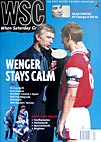 Rangers have joined Celtic in admitting they want to leave the Scottish Premier League. Gary Oliver thinks it can't happen soon enough
Rangers have joined Celtic in admitting they want to leave the Scottish Premier League. Gary Oliver thinks it can't happen soon enough
The new Premier League season had barely begun when BBC Scotland breathlessly announced that Rangers and Celtic intend to quit Scottish football, the pair ganging up with soul mates from abroad within two years. For viewers who had just switched over to Friday Sportscene from Channel 4, and who felt they had heard this one before, it was perhaps appropriate that the story was broken straight after Eurotrash.
Celtic’s desire to forsake Scotland is well documented, and their recent announcement of a £6 million trading loss has concentrated minds still further. For much of last season, chief executive Allan MacDonald talked up the prospects of a renegade North Atlantic League, in which Celtic would band together with the most powerful clubs in Holland, Belgium, Portugal and Scandinavia.
The proposals then were vague and contradictory and the notion of an ersatz Champions League evidently did not impress UEFA. Now it is envisaged that much the same B-list teams will compete together instead of at home, the domestic competitions to feed the new monster. No one has yet explained how this set-up might interact with the Champions League, though rest assured the clubs involved are not contemplating life without wallowing in that trough too.
With relatively few countries reported to be involved, it is a format that might seem to have a very limited shelf life. Nevertheless, Rangers, hitherto wary of compromising any Champions League involvement, have now performed a handbrake turn and come out in support of such an arrangement.
Yet it is only a few months since chairman David Murray, proclaiming his “sense of responsibility”, denounced Celtic’s posturing as “detrimental to Scottish football”. But now, warning that “something dramatic must be done”, he judges that “we are hindering Scottish football… it would be better for other clubs not to financially strain themselves trying to keep up with Rangers and Celtic”.
This is the man who in January claimed that without the Old Firm Scottish football would be “all over bar the shouting”. One must therefore assume that Murray’s summer volte-face was prompted not by altruism, but by the embarrassment of various foreign strikers declining to take his shilling.
The history of the Scottish Premier League is of clubs maximising and preserving their fixtures with Rangers and Celtic. It is perhaps surprising, then, that this latest Euro model has received general approval from other clubs within the SPL. The possibility of at least one other Scottish side becoming involved, plus the promise of compensation payments to the rump, has ensured that most club officials are on-message. “The league is a logical extension of how businesses are marketing themselves in Europe now,” observed Hearts’ Chris Robinson, possibly sensing an opportunity to recoup some of the £1.4 million lost by his club in the past six months.
Lex Gold, chairman of the SPL, has insisted that for SPL clubs of all levels the euro proposal is “win, win, win”. And most pundits are also quite relaxed at the prospect of a Scottish League shorn of the Old Firm. One dissenter on Radio Scotland, Keith Jackson of the Daily Record, opined that Scottish fans would miss the “razzamatazz” that surrounds Rangers and Celtic. Yes, much as the people of Northern Ireland would miss the “razzamatazz” of the Drumcree march. A few other pessimists have warned of the remnant sinking to the level of the League of Ireland; however, Aberdeen’s UEFA Cup humbling by Bohemians indicates it is a little late to be worrying about that particular comparison.
With Rangers and Celtic now openly contemptuous of the domestic competition, many opposing fans will feel that the sooner they go the better. A league bereft of the duo should certainly produce what most Scots yearn for – a top division that is truly competitive. But whether the Scottish champions would then be allowed on board the gravy train, even temporarily, is anyone’s guess. Any European league designed to cosset clubs already oligarchic at home is unlikely to be a genuine meritocracy.
Now all the talk is of how the larger television audience will enable clubs to inflate even further the wages they offer. Small wonder, then, that Stig Nilsson of Swedish league leaders Halmstad rejected the group’s pecuniary priority, condemning the agitators as “people who let themselves be hypnotised by thoughts of money”. But only if UEFA now reacts by further expanding its existing competitions are Rangers, Celtic and the others likely to snap out of it.
From WSC 164 October 2000. What was happening this month